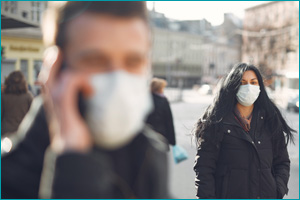Speak up!
If you've written a blog, wish to share a story, or have an idea that you believe would help those visiting the End With Care website, please send it along. If fitting, we'll add your voice to End With Care.
I've got an ideaDeath Cafes in the Time of COVID-19
Posted on February 15, 2021
 Unless one was around during the influenza pandemic of 1918, we have never experienced such unimaginable times. Once normal day-to-day activities have been severely limited. Our welfare has been jeopardized, and our very lives endangered. Along with these drastic changes to our lifestyle, the daily accounting of the realities of COVID-19 have made it difficult not to recognize our mortality. Although it has never been an easy subject, talking about death is as important and perhaps more needed than ever.
Unless one was around during the influenza pandemic of 1918, we have never experienced such unimaginable times. Once normal day-to-day activities have been severely limited. Our welfare has been jeopardized, and our very lives endangered. Along with these drastic changes to our lifestyle, the daily accounting of the realities of COVID-19 have made it difficult not to recognize our mortality. Although it has never been an easy subject, talking about death is as important and perhaps more needed than ever.
A Place to Talk About Death
The work of Swiss sociologist, Bernard Crettaz and his “café mortel” in 2004 was the inspiration for Jon Underwood to hold the first Death Café in London in 2011. His model created an opportunity and a setting, usually over some tea and cake, for people to gather and have conversations about death. The objective being “to increase awareness of death with a view to helping people make the most of their (finite) lives”.
The basic idea was not about end-of-life planning or grief or bereavement groups, but with creating a forum to openly discuss and share our opinions, fears, and thoughts about this important yet little talked about topic. Central to his view, Underwood said, "When we acknowledge that we're going to die, it falls back on ourselves to ask the question, Well, in this limited time that I've got, what's important for me to do? "
This concept has flourished as Death Cafes have spread across Europe to North America and beyond. Death Cafes have indeed had a global impact, offered now in 75 counties.What to Expect at a Death Café
Think of a Death Café event as a facilitated group discussion where people of all ages, backgrounds, genders, and experiences can safely and comfortably gather to talk. There are no predetermined agendas or specific objectives, instead simply a place to freely have conversations about death and dying.  Typically, a facilitator or host will welcome participants, explain the basic format for the meeting, and may offer an icebreaker to help kickoff the discussion. Other than a healthy and polite exchange, there is no goal toward reaching some particular conclusion. The aim of a Death Cafe is not to correct a problem or remedy an issue, rather it is an opportunity for a free-flowing dialogue, in an atmosphere that can encourage sharing as a means to support one another.
Typically, a facilitator or host will welcome participants, explain the basic format for the meeting, and may offer an icebreaker to help kickoff the discussion. Other than a healthy and polite exchange, there is no goal toward reaching some particular conclusion. The aim of a Death Cafe is not to correct a problem or remedy an issue, rather it is an opportunity for a free-flowing dialogue, in an atmosphere that can encourage sharing as a means to support one another.
Expect to participate in open, unscripted conversations. Expect to share the experience with those from all walks of life. Expect an atmosphere that can be as light and casual as is serious. Expect the freedom to express thoughts, feelings, fears, and opinions on death and dying in a confidential and safe environment.
From Personal to Digital
The pandemic has touched so many aspects of our lives, even affecting how we might grieve and how we might put loved-ones to rest. As a result of the coronavirus, dying without having family and friends around has now become more the norm. But at the same time, the pandemic has brought our awareness of death to the forefront and has increased interest in Death Cafes. The need to talk about death and dying is no more important, but COVID-19 has affected where and how we are able to have those conversations.
A Legacy of Support
Regardless of the venue, the value from participating in Death Café events remain. They provide a chance to be with others who are willing to discuss our mortality, as well as to be a part in the growing death-positive movement. Death Cafes also allow us another way to manage distress and anxiety, improve coping skills, and offer each other support.
They provide a chance to be with others who are willing to discuss our mortality, as well as to be a part in the growing death-positive movement. Death Cafes also allow us another way to manage distress and anxiety, improve coping skills, and offer each other support.
Jon Underwood’s innovative Death Cafes have helped contribute to breaking taboos, and have encouraged and facilitated our ability to have conversations about death and dying. Underwood came to learn that these gatherings can often be more about laughter than tears and less about how to die than how to live. A Death Café is an opportunity to gather together and explore life and death while maybe even having a bite to eat and a cup of tea.
To learn more, you can find a Death Cafe event near you, or if interested in hosting, download their guide on how to hold your own Death Cafe.


